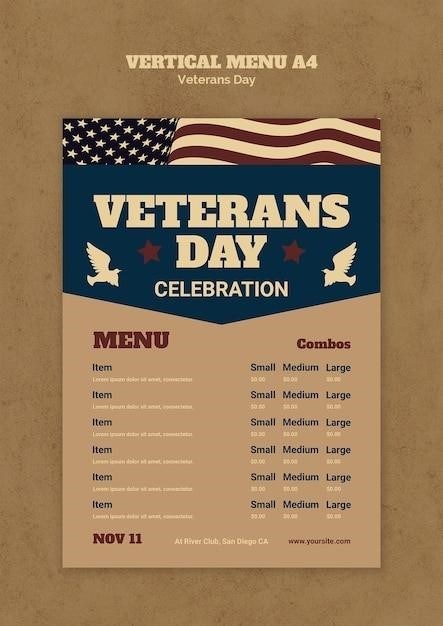Marine Corps Counseling Sheet PDF⁚ A Comprehensive Guide

The NAVMC 2795‚ formally known as the U.S. Marine Corps Users Guide to Counseling‚ serves as a vital resource designed to facilitate continuous motivation among Marine leaders and their teams towards personal and professional development. This comprehensive guide outlines the structured approach to counseling within the Marine Corps‚ providing a framework for effective communication‚ performance feedback‚ and career development. This article will delve into the importance of counseling in the Marine Corps‚ the structure and elements of the NAVMC 2795 form‚ and essential tips for effective counseling sessions.
Understanding the Importance of Counseling in the Marine Corps
Counseling is an integral part of the Marine Corps culture‚ serving as a cornerstone for leadership development‚ performance enhancement‚ and overall unit cohesion. It provides a structured platform for Marines to receive feedback‚ guidance‚ and support‚ fostering a culture of continuous improvement and professional growth. Effective counseling sessions empower Marines to identify their strengths and weaknesses‚ set realistic goals‚ and develop strategies for achieving success in their roles and careers.
Beyond individual development‚ counseling plays a critical role in maintaining unit readiness and mission accomplishment. By fostering open communication and addressing concerns proactively‚ leaders can identify potential issues early on‚ preventing them from escalating into larger problems. This proactive approach contributes to a positive and supportive unit environment where Marines feel valued‚ respected‚ and empowered to perform at their best.
The Marine Corps recognizes the importance of counseling in shaping its leadership ethos. It is considered a fundamental leadership skill‚ essential for nurturing a sense of responsibility‚ accountability‚ and personal growth among Marines. By embracing counseling as a regular practice‚ leaders can build stronger relationships with their Marines‚ foster trust‚ and create an environment conducive to both individual and collective success.
The NAVMC 2795⁚ A Key Tool for Leadership and Development
The NAVMC 2795‚ formally known as the U.S. Marine Corps Users Guide to Counseling‚ serves as a standardized framework for conducting counseling sessions within the Marine Corps. This document provides a structured approach to facilitate effective communication between leaders and Marines‚ ensuring that counseling sessions are conducted consistently and comprehensively. The NAVMC 2795 is not just a form to be filled out; it is a valuable tool for fostering a culture of continuous improvement and personal growth within the Marine Corps.
The form itself is designed to guide leaders through a systematic process of counseling. It includes sections for outlining the purpose of the counseling session‚ identifying specific areas for discussion‚ setting goals and objectives‚ and documenting the outcomes of the session. By following the structure of the NAVMC 2795‚ leaders can ensure that they address all relevant aspects of a Marine’s performance‚ development‚ and well-being.
The NAVMC 2795 serves as a vital resource for both leaders and Marines. It provides a common language and framework for understanding the counseling process‚ fostering a culture of transparency and accountability. By utilizing this document‚ leaders can develop more effective counseling techniques‚ while Marines can gain a clearer understanding of their strengths‚ weaknesses‚ and areas for improvement; Ultimately‚ the NAVMC 2795 contributes to the overall effectiveness and professionalism of the Marine Corps.
Types of Counseling Sessions
The Marine Corps utilizes a variety of counseling sessions tailored to different needs and circumstances. These sessions provide a structured framework for addressing performance‚ development‚ and personal issues. The types of counseling sessions commonly employed within the Marine Corps include⁚
- Performance Counseling⁚ This type of counseling focuses on a Marine’s job performance‚ identifying strengths‚ weaknesses‚ and areas for improvement. It may involve discussing specific tasks‚ skills‚ or behaviors that require attention.
- Professional Development Counseling⁚ This type of counseling focuses on a Marine’s career goals‚ aspirations‚ and development opportunities. It may involve discussing training‚ education‚ or leadership development plans.
- Personal Counseling⁚ This type of counseling addresses personal issues that may be affecting a Marine’s performance or well-being. It may involve discussing family matters‚ financial concerns‚ or mental health challenges.
- Event-Oriented Counseling⁚ This type of counseling is conducted in response to specific events or situations‚ such as disciplinary actions‚ promotions‚ or deployments. It focuses on addressing the immediate concerns and providing guidance for future actions.
The specific type of counseling session will depend on the individual Marine’s needs and the purpose of the meeting. By understanding the different types of counseling sessions available‚ leaders can select the most appropriate approach to address the unique circumstances of each Marine.
The Structure of the Counseling Sheet
The NAVMC 2795 counseling sheet is designed to provide a structured framework for documenting and facilitating effective counseling sessions. The form is divided into distinct sections‚ each serving a specific purpose. The structure of the sheet is as follows⁚
- Counseling Information⁚ This section captures basic administrative details‚ including the date‚ time‚ and location of the counseling session. It also includes the names‚ ranks‚ and units of both the counselor and the Marine being counseled.
- Counseling Objectives⁚ This section outlines the specific goals and objectives of the counseling session. It clarifies the purpose of the meeting and provides a clear focus for the discussion.
- Discussion Points⁚ This section is dedicated to documenting the key points discussed during the counseling session. It may include performance reviews‚ professional development plans‚ personal concerns‚ or any other relevant topics.
- Recommendations⁚ This section outlines any recommendations or actions that were agreed upon during the counseling session. It may include specific goals‚ training plans‚ or resources to support the Marine’s development.
- Follow-Up Plan⁚ This section outlines the plan for follow-up actions and future counseling sessions. It may include dates for future meetings‚ deadlines for completing tasks‚ or any other relevant information.
- Signatures⁚ Both the counselor and the Marine being counseled are required to sign the sheet‚ indicating their understanding and agreement with the contents of the session.
This structured format ensures that counseling sessions are conducted in a comprehensive and organized manner‚ promoting clear communication and accountability.
Essential Elements of a Counseling Session
Effective counseling sessions are crucial for the development and well-being of Marines. Beyond the structure of the NAVMC 2795‚ several essential elements contribute to a successful counseling session. These elements are⁚

- Active Listening⁚ The counselor must actively listen to the Marine‚ demonstrating genuine interest and understanding. This involves paying close attention to both verbal and non-verbal cues‚ asking clarifying questions‚ and summarizing the Marine’s perspective to ensure understanding.
- Open Communication⁚ A trusting and open communication environment is paramount. The counselor should foster a safe space for the Marine to express their thoughts and feelings without fear of judgment or reprisal.
- Feedback and Guidance⁚ The counselor should provide constructive feedback on the Marine’s performance‚ highlighting strengths and areas for improvement. This feedback should be specific‚ timely‚ and actionable‚ offering clear guidance for development.
- Goal Setting⁚ Counseling sessions should involve setting clear‚ measurable‚ attainable‚ relevant‚ and time-bound (SMART) goals. These goals should align with the Marine’s professional and personal aspirations.
- Action Planning⁚ Once goals are established‚ a plan of action should be developed to achieve them. This may involve identifying resources‚ training opportunities‚ or support systems.
- Follow-Up⁚ Regular follow-up is essential to track progress and ensure accountability. This may involve scheduled meetings‚ written reports‚ or other forms of communication to monitor the Marine’s development;
By incorporating these essential elements‚ counselors can ensure that counseling sessions are productive‚ meaningful‚ and contribute to the Marine’s overall growth and success.
Benefits of Utilizing the Counseling Sheet
The NAVMC 2795 Counseling Sheet offers numerous benefits for both Marines and their leaders‚ contributing to a more effective and supportive environment within the Marine Corps. Here are some key advantages of utilizing this tool⁚
- Improved Communication⁚ The structured format of the sheet facilitates clear and concise communication between Marines and their leaders‚ fostering open dialogue and understanding. This leads to a more productive and efficient exchange of information.
- Enhanced Performance⁚ By providing a framework for performance feedback and goal setting‚ the counseling sheet encourages Marines to strive for excellence and develop their skills. Regular counseling sessions allow for timely identification of strengths and areas for improvement‚ leading to enhanced performance and professional growth.
- Increased Motivation⁚ Counseling sessions that focus on individual development and career goals can boost morale and increase motivation among Marines. When Marines feel supported and valued‚ they are more likely to be engaged and committed to their roles.
- Improved Leadership⁚ The counseling process helps leaders to develop their leadership skills‚ promoting effective communication‚ mentorship‚ and guidance. Leaders gain valuable insights into their Marines’ needs and aspirations‚ fostering stronger relationships and a more cohesive team environment.
- Documentation and Accountability⁚ The counseling sheet provides a written record of the session‚ including goals‚ action plans‚ and progress updates. This documentation serves as a valuable resource for both Marines and leaders‚ ensuring accountability and demonstrating a commitment to continuous improvement.
The NAVMC 2795 Counseling Sheet serves as a powerful tool for fostering a culture of professional development‚ communication‚ and support within the Marine Corps.
Tips for Effective Counseling
Effective counseling is a crucial aspect of leadership within the Marine Corps. To maximize the benefits of counseling sessions and ensure they are productive and impactful‚ leaders should consider these tips⁚
- Establish a Positive Environment⁚ Create a comfortable and respectful atmosphere where Marines feel safe to share their thoughts and concerns. Avoid distractions and dedicate your full attention to the session.
- Active Listening⁚ Practice active listening by paying close attention to what the Marine is saying‚ both verbally and nonverbally. Ask clarifying questions to ensure you understand their perspective and demonstrate genuine interest.
- Focus on Goals⁚ Clarify the purpose of the counseling session and establish clear goals for the Marine. Discuss their aspirations and work together to develop a plan to achieve them.
- Provide Constructive Feedback⁚ Deliver feedback in a positive and constructive manner‚ focusing on specific behaviors and actions. Offer suggestions for improvement and highlight the Marine’s strengths.
- Be Solution-Oriented⁚ Work collaboratively with the Marine to identify solutions and develop an action plan. Encourage them to take ownership of their development and provide support along the way.
- Document Progress⁚ Record the key points discussed during the session‚ including goals‚ action plans‚ and any agreed-upon deadlines. This documentation will help track progress and ensure accountability.
- Follow-Up⁚ Schedule regular follow-up sessions to review progress‚ address any challenges‚ and provide ongoing support. This demonstrates your commitment to the Marine’s development and reinforces the importance of counseling.
By following these tips‚ Marine Corps leaders can conduct effective counseling sessions that foster growth‚ improve performance‚ and strengthen the bonds within their units.
Where to Find the Marine Corps Counseling Sheet PDF
The NAVMC 2795‚ the official Marine Corps Counseling Sheet‚ is readily accessible through various online resources. Here’s a breakdown of how to locate it⁚
- Marine Corps Publications Management System⁚ The MCPEL (Marine Corps Publications Electronic Library) is the primary source for official Marine Corps documents. You can access the NAVMC 2795 directly through the MCPEL website‚ where you can browse‚ download‚ and print the PDF version of the form.
- Training Command Website⁚ The Training Command website‚ specifically the TBS (The Basic School) section‚ provides access to a variety of training resources‚ including the NAVMC 2795. You can find the document within the Counseling and Mentoring Program materials available on their site.
- Third-Party Websites⁚ Numerous websites offer downloadable forms‚ including the NAVMC 2795. Be cautious when utilizing third-party sources‚ as the content may not always be the most up-to-date version. Always verify the source and ensure the document is an official Marine Corps publication.
- Your Unit⁚ Your unit’s administrative section or your leadership should have access to the NAVMC 2795. Reach out to them for a physical copy or guidance on how to obtain the digital version.
Remember‚ it’s essential to ensure you are using the most current version of the NAVMC 2795. Always check the publication date to ensure you have the latest form.
Digital Solutions for Filling Out the Counseling Sheet
The traditional method of printing‚ filling out‚ and then scanning the NAVMC 2795 Counseling Sheet is becoming outdated. Fortunately‚ there are several digital solutions available that streamline the process‚ making it more efficient and convenient⁚
- Online Form Fillers⁚ Many websites offer fillable PDF templates for the NAVMC 2795. These platforms allow you to type directly into the form fields‚ eliminating the need for handwriting. Some services provide additional features like e-signatures and the ability to save the completed form in various formats.
- Digital Signature Software⁚ Services like airSlate SignNow enable you to fill out‚ sign‚ and share the NAVMC 2795 electronically. These platforms offer a user-friendly interface and advanced functionality‚ making document management easier.
- Marine Corps Electronic Systems⁚ The Marine Corps is constantly developing and improving its electronic systems. In the future‚ there may be dedicated online platforms or mobile applications specifically designed for filling out and managing counseling documents like the NAVMC 2795. Stay informed about any updates from the Marine Corps regarding digital solutions for counseling.
By utilizing digital solutions‚ you can save time‚ reduce paper waste‚ and ensure the counseling process is more efficient. Consider exploring the various options available to find the best fit for your needs.
Additional Resources for Marine Corps Counseling
While the NAVMC 2795 Counseling Sheet is a valuable tool‚ it’s not the only resource available to support Marine Corps counseling. Numerous additional resources can enhance the effectiveness of counseling sessions and provide further guidance for leaders and Marines⁚
- Marine Corps Order 1500.58 (MCMP)⁚ This order outlines the Marine Corps Mentoring Program (MCMP)‚ a comprehensive program designed to foster leadership development through mentorship. The MCMP complements counseling by providing a structured framework for long-term guidance and support.
- MCO 1610.7B⁚ This order provides guidance for career management and development‚ including information on requesting and preparing for career counseling‚ accessing self-audit tools‚ and reviewing selection board debriefs and comparative assessments.
- Online Resources⁚ Websites like the official Marine Corps website (www.marines.mil) and the Marine Corps Professional Education Library (MCPEL) offer a wealth of information on counseling‚ leadership‚ and professional development. These resources provide guidance on best practices‚ techniques‚ and additional forms and templates.
- Training and Workshops⁚ The Marine Corps offers various training courses and workshops specifically focused on counseling and leadership development. These programs equip leaders with the necessary skills and knowledge to conduct effective counseling sessions.
By exploring these additional resources‚ Marine leaders can gain a more comprehensive understanding of counseling and develop their skills to provide meaningful support and guidance to their Marines.



